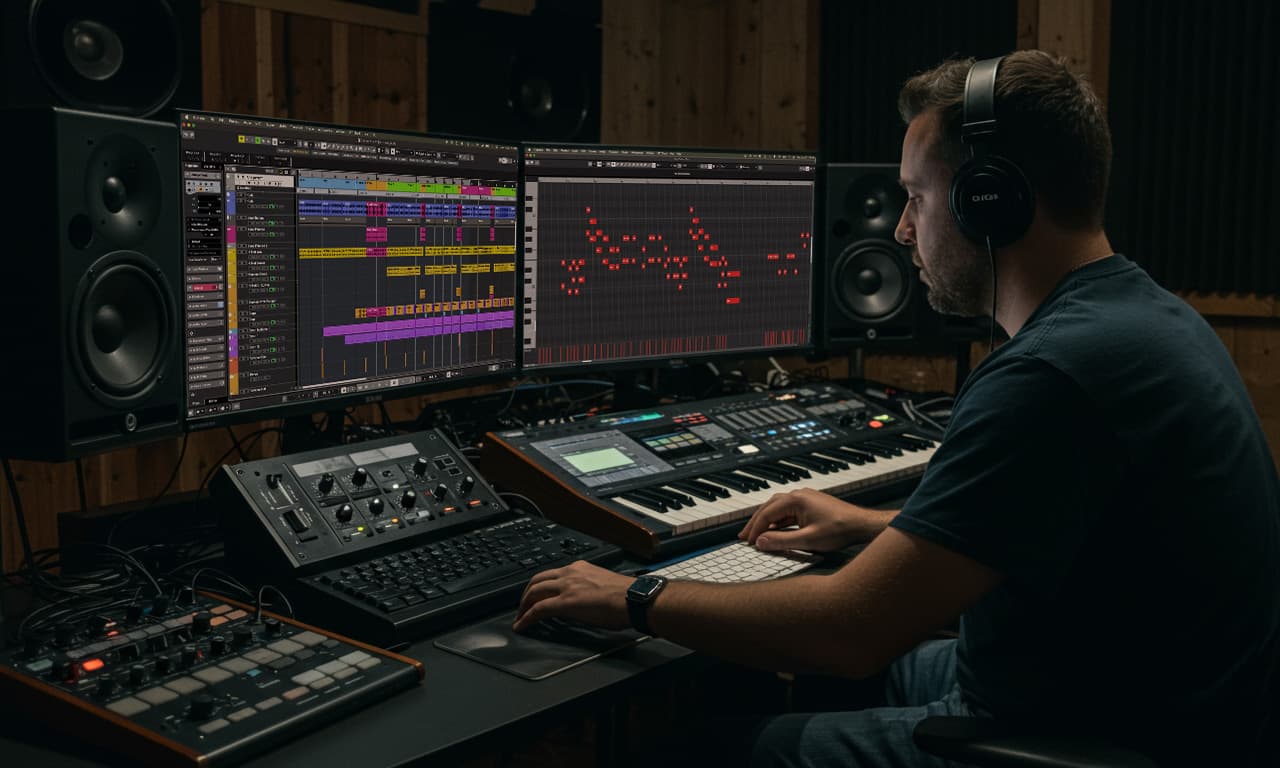How long does it take to produce an Electronic Music song?

July 23 2025
Creating an electronic music track is a creative journey that can take anywhere from a few days to several months, depending on the level of detail, the producer’s experience, and the musical style. Whether it’s House, Techno, Trance, Psytrance, or Progressive, each genre has unique characteristics that influence the process and timeline of production.
🧠 1. Structure Design: The Skeleton of Your Track (2–6 hours)
Before playing a single note, many producers start by designing the overall structure of the track. This serves as a map that guides the energy of the song.
A typical structure might look like this:
Intro → Build → Break → Drop → Break → Bridge → Drop → Outro
Some producers use empty MIDI clips as placeholders to visualize where each section will go. This helps with composition and ensures a logical flow. Depending on the genre:
- House: may have a long intro and subtle grooves.
- Techno: often more repetitive, with small changes every bar.
- Psytrance: uses longer builds and more spacious drops.
⏱️ Estimated time: 2 to 6 hours.
🎛️ 2. Sound Design: Building Your Palette (6–20 hours)
Once the structure is set, it’s time for sound design:
- Kick: strong, defined, genre-appropriate.
- Bassline: deep, punchy, rhythmic.
- Synths and Leads: melodic or hypnotic, depending on style.
- Vocals or FX: add texture or narrative.
Sounds are created or selected using synthesis, resampling, or sample libraries. This can be an obsessive process, as many artists seek a unique sonic identity.
🎧 Example: Astrix has mentioned it can take over a week just to find the right kick and bass for a track.
⏱️ Estimated time: 6 to 20 hours (sometimes more).
🎹 3. Composition: Bringing the Piano Roll to Life (4–12 hours)
With the sounds ready, it’s time to compose melodies, rhythms, and harmonic progressions. This stage defines:
- The groove of the bass and drums.
- Main melodies.
- Fills and variations.
Everything is drawn into the piano roll using MIDI notes. Vocal ideas might also be recorded, or rhythmic samples added.
⏱️ Estimated time: 4 to 12 hours.
🎚️ 4. Automation and FX: The Soul in Motion (3–10 hours)
A flat song won’t move anyone. This is where filters, reverbs, delays, and other effects come in:
- Filter sweeps for smooth transitions.
- Automation of volume and FX to build tension or release energy.
- Tempo, pitch, or texture changes to keep things interesting.
Automation transforms a static loop into a dynamic journey.
⏱️ Estimated time: 3 to 10 hours.
🍓 5. Details and FX: The Icing on the Cake (2–6 hours)
This is the moment to add special details, like:
- Reverse crashes, glitches, white noise.
- Small rhythmic fills, unexpected hits.
- Ambient sounds or vocal chops.
Think of it as decorating a cake: the icing, strawberries, and chocolate ribbon. Not essential, but unforgettable.
⏱️ Estimated time: 2 to 6 hours.
🎧 6. Mixing and Final Distribution Format (4–16 hours)
Finally, it's time to balance all the elements:
- Leveling volumes.
- Placing each instrument in its space (panning, EQ).
- Using compression and saturation to add character.
Instead of using the term “master,” some prefer to call it the final production and distribution format, to avoid the historical weight of the term.
The final file should sound good on clubs, radios, and streaming platforms.
⏳ Total Estimated Time
| Stage | Approximate Time |
|---|---|
| Sound Design | 6 – 20 hours |
| MIDI Composition | 4 – 12 hours |
| Automation and FX | 3 – 10 hours |
| Details and FX | 2 – 6 hours |
| Mixing and Distribution | 4 – 16 hours |
| ⏱️ Total: | 21 to 70 hours |
🎶 Some producers like Astrix, Boris Brejcha, or Deadmau5 can spend weeks or even months finishing a single track, depending on their level of perfectionism.
✅ Final Tips
- Don’t get frustrated if a track takes you weeks. It’s completely normal.
- Save presets and templates to save time in future productions.
- Rest your ears! Take a break every hour-long session.
- De-stress! Exercise, watch a movie, take a walk.
When ideas don’t flow, do something different—when you return, inspiration might too. - Enjoy the process. Every session is a chance to learn and grow.
🎵 Producing electronic music isn’t just about talent: it’s a marathon of creative decisions. Next time you hear a drop that gives you goosebumps, you’ll know that behind it were countless hours of passion, editing, and digital magic. 😉